Stay in the Loop
BSR publishes on a weekly schedule, with an email newsletter every Wednesday and Thursday morning. There’s no paywall, and subscribing is always free.
Puccini in reverse
Opera Philadelphia presents Puccini’s La Bohème

Let’s start at the beginning—which, in this case, happens to be the end. Opera Philadelphia’s revamped production of La Bohème reverses the order of Puccini’s classic romance, placing Act 4 at the top of the performance and working backward. The ache of tragedy progresses to the swelling of new love, with all the trials and tribulations happening in between, in a slightly disjointed order.
Does it work? More or less. Does it add anything new to this piece, perhaps the most familiar opera in the standard repertory? I’m not so sure.
A popular reversal
Director Yuval Sharon premiered this interpretation last year at Detroit Opera, where he serves as artistic director. It’s already proven a popular regional commodity, with productions in Boston and Charleston before the current Philly engagement, and it will likely continue to be seen around the country. Although Sharon condenses the performance to a fluid 100 minutes sans intermission, he remains faithful to the letter of the score; despite the excision of the rent collector Benoît in Act 1 (welcome, in my opinion), cuts are miniscule.
The primary directorial insertion, however, is an unfortunate one: amid the music, Sharon introduces a spoken narrator, called the Wanderer, who frequently interrupts the action, ostensibly to guide the audience through the performance’s unfamiliar structure. Costumed like one of the tramps from Waiting for Godot and portrayed archly by local actor Anthony Martinez-Briggs, the Wanderer’s appearances tend to stop the show cold. His presence is unnecessary, especially given Sharon’s general fidelity to the material. Trust the audience to orient themselves in the world you are creating.
Still endearing after 127 years
Otherwise, the performance conjured the familiar feelings associated with this opera. The perennial popularity of La Bohème might be something of a cliché in music circles, but it endures with good reason. The lush music and affecting storytelling are simply bulletproof. The audience feels the emotional pull of Mimì and Rodolfo’s doomed love whether they see it forward, backward, or anywhere in between. The surrounding characters, comic and human all at once, remain as recognizable and endearing as they were when the opera premiered 127 years ago.
Sharon’s true triumph rests in the deep relationships he portrays among the opera’s central couples. By casting younger singers as the leading pair—here, the tenor Joshua Blue as Rodolfo and soprano Kara Goodrich as Mimì—he fully captures the passionate spark of young love. He directs Marcello and Musetta (Troy Cook and Melissa Joseph) not as squabbling caricatures but as a tempestuous yet caring pair of opposites attracting.
Ready for the starring roles
This production conceives of the philosopher Colline and musician Schaunard as a same-sex couple—not unlike the one they would morph into for Jonathan Larson’s rock opera RENT—and it’s charming to watch their subtle interactions from that lens, especially in the tender performances of Benjamin Taylor and Adam Lau. Lau’s secure, cavernous bass rendered Act 4’s “coat aria” a highlight of the evening.

Impressive last season as the Duke of Mantua in Opera Philadelphia’s Rigoletto, Blue sounds even better here, his ringing tenor blooming beautifully to a solid high C in “Che gelida manina.” Goodrich, an Academy of Vocal Arts graduate, proves sympathetic and stage-worthy in her first major role with the company. The middle and lower registers of her voice are her glory; although all high notes were in place, they sometimes sounded constricted.
What good opera directors should do
Audience members who want a traditional La Bohème can head to New York City, where Yannick Nézet-Séguin is currently conducting a revival of the classic Franco Zeffirelli production at the Met, or the Washington, where a similarly faithful interpretation is set to open at the Kennedy Center next week. Sharon’s reimagining is unlikely to supplant these more conservative views of the work. But even where it errs, it does what good opera direction should by putting a new spin on an old chestnut.
What, When, Where
La Bohème. By Giacomo Puccini, Giuseppe Giacosa, and Luigi Illica; directed by Yuval Sharon. Opera Philadelphia. Through May 7, 2023, at the Academy of Music, 240 S Broad Street, Philadelphia. (215) 893-1999 or operaphila.org.
Accessibility
The Academy of Music is a wheelchair-accessible venue. Accessible seating can be arranged in advance by calling (215) 732-8400. Audio description will be available for the Sunday, May 7, performance of La Bohème.
Masks are not required.
Sign up for our newsletter
All of the week's new articles, all in one place. Sign up for the free weekly BSR newsletters, and don't miss a conversation.

 Cameron Kelsall
Cameron Kelsall